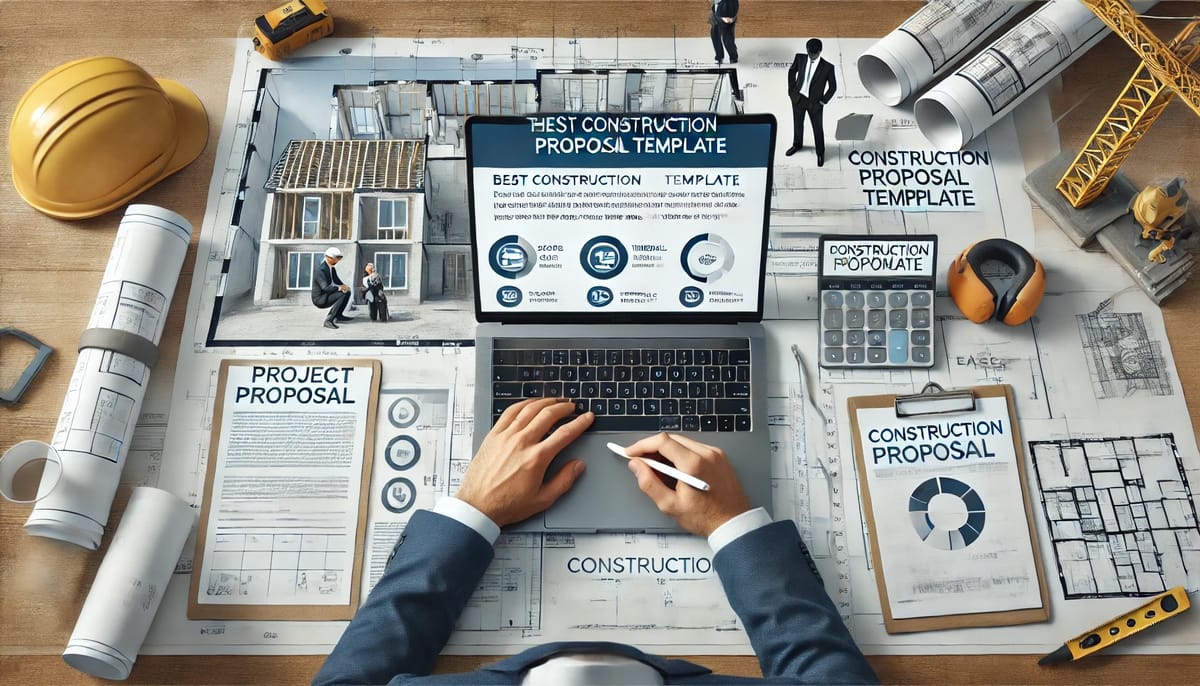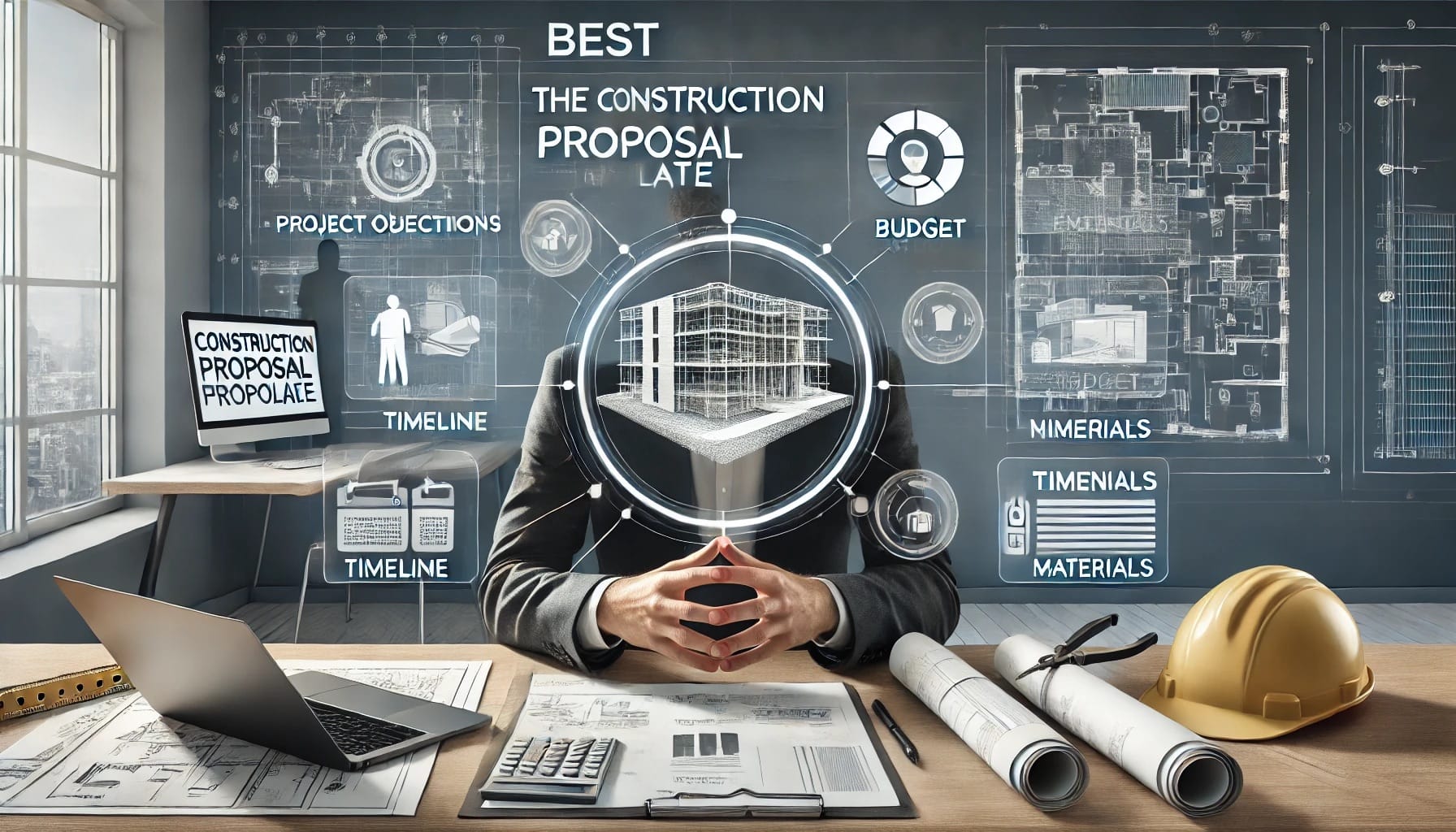Craft the Best Construction Proposal Template with Ease
Learn how to create the perfect construction proposal template to win bids, set clear expectations, and deliver successful projects.

Every construction project begins with a proposal, a document that outlines the scope, costs, and timelines for the project. For general contractors, creating a compelling construction proposal is crucial during the bidding process. A well-prepared construction proposal template can not only showcase your expertise but also set clear expectations, build trust, and serve as a legally binding contract once accepted.
This guide will explain what a construction proposal is, why it's vital for your business, and how to create the perfect construction proposal template to win bids and ensure project success.

What Is a Construction Proposal?
A construction proposal is a detailed document submitted during the bidding process to outline the specifics of a construction project. It typically includes information about the contractor, project scope, costs, timelines, and any other critical details. Beyond being a bid, it serves multiple purposes:
- Showcase of Expertise: Highlights your qualifications and experience.
- Legal Agreement: Once signed, it becomes a legally binding contract.
- Project Roadmap: Clarifies roles, responsibilities, and expectations.
- Sales Tool: Demonstrates your ability to meet client needs effectively.
By including all essential details, the proposal protects both parties and prevents misunderstandings or disputes during the project lifecycle.
Why Is a Construction Proposal Important?
1. Sets Clear Expectations
A well-written construction proposal ensures both the contractor and client understand the project's scope, costs, and timeline. This eliminates ambiguities that can lead to conflicts.
2. Protects Legal Interests
In case of disputes, the signed proposal serves as a legally binding document that clearly outlines agreed-upon terms and conditions.
3. Enhances Professionalism
A polished and comprehensive proposal positions your business as reliable and detail-oriented, giving you a competitive edge over other contractors.
4. Improves Project Management
The proposal outlines deliverables, milestones, and payment schedules, providing a roadmap for efficient project execution.
Key Elements of a Construction Proposal
To create an effective construction proposal, include the following essential components:
1. Basic Information of the Parties
Include the names, addresses, and contact information of all involved parties. Ensure this section is accurate, as it establishes the legal identities in the contract.
2. Scope of Work
Detail the services and tasks you will provide, including:
- The type of work (e.g., excavation, plumbing, roofing).
- Quality standards and materials to be used.
- Exclusions or work outside the project's scope.
3. Costs and Payment Terms
Break down costs into categories such as labor, materials, and equipment. Clearly outline:
- Total project cost.
- Payment schedules (e.g., upfront deposit, milestone payments).
- Late payment fees or penalties.
4. Work Schedule
Provide a detailed timeline, including:
- Start and completion dates.
- Key milestones.
- Provisions for delays caused by weather, supply chain issues, or client decisions.
5. Relevant Authorities
Specify the parties authorized to make decisions or approve changes. This is critical for large projects involving multiple stakeholders.
6. Signatures
Include spaces for signatures from both parties to formalize the agreement. This ensures mutual understanding and acceptance of the terms.
How to Create the Perfect Construction Proposal Template
Follow these steps to design a template that streamlines your bidding process and improves your chances of winning contracts:
1. Choose a Professional Format
Start with a clean and professional layout. Use tools like Microsoft Word or Excel to structure the proposal. Incorporate your company logo and branding for a polished look.
2. Write a Strong Introduction
Begin with a cover letter or introduction that highlights your company’s expertise and explains why you are the best fit for the project.
3. Provide Detailed Descriptions
Each section of the proposal should be thorough and precise. For example:
- Use an itemized list for materials and labor costs.
- Specify the type and brand of materials to ensure transparency.
4. Include a Timeline
Create a Gantt chart or similar visual aid to map out the project timeline. This helps clients visualize the workflow and deadlines.
5. Add Legal Protections
Incorporate clauses for:
- Change orders: How additional work will be handled.
- Liability: Define who is responsible for delays or damages.
- Dispute resolution: Outline steps for resolving disagreements.
6. Customize for Each Client
While templates save time, always tailor the proposal to address the specific needs and concerns of each client. This demonstrates attention to detail and commitment.
7. Proofread and Review
Errors in a proposal can undermine your professionalism. Double-check all information for accuracy and clarity before submission.
Free Construction Proposal Templates
If starting from scratch feels overwhelming, use one of these templates to kickstart your process:
1. Basic Construction Proposal Template
Ideal for small projects, this template includes sections for client information, scope of work, and payment terms.
2. Detailed Commercial Construction Template
This template caters to larger projects and includes sections for team qualifications, project phases, and detailed cost breakdowns.
3. Residential Construction Proposal Template
Perfect for home improvement projects, it includes fields for house plans, past project examples, and client testimonials.
4. Materials Proposal Template
Focuses on itemized lists of materials required for the project, along with their costs.
5. Gantt Chart Work Schedule Template
Includes a visual timeline for tracking milestones and deadlines.
Tips for Writing an Effective Construction Proposal
1. Be Clear and Concise
Avoid jargon and overly technical language. Make the proposal easy for clients to understand.
2. Emphasize Value
Highlight how your expertise, materials, or timeline offers better value compared to competitors.
3. Incorporate Visuals
Use charts, graphs, or images to make the proposal visually appealing and easier to navigate.
4. Maintain Transparency
Disclose all costs, including potential additional charges, to build trust with the client.
5. Follow Up
After submitting the proposal, follow up with the client to address any questions or concerns. This shows initiative and professionalism.
Conclusion
A well-crafted construction proposal is the cornerstone of winning bids and delivering successful projects. By including all necessary details, presenting clear terms, and showcasing your expertise, you can create a proposal that not only secures contracts but also builds long-term client relationships.
Use the steps and templates provided to streamline your proposal process. Whether you’re managing residential, commercial, or industrial projects, a strong proposal sets the foundation for effective collaboration and project success.
Source: How to Make The Best Construction Proposal Template
Check out our latest post: Boost Employee Wellbeing with Effective Workload Management





